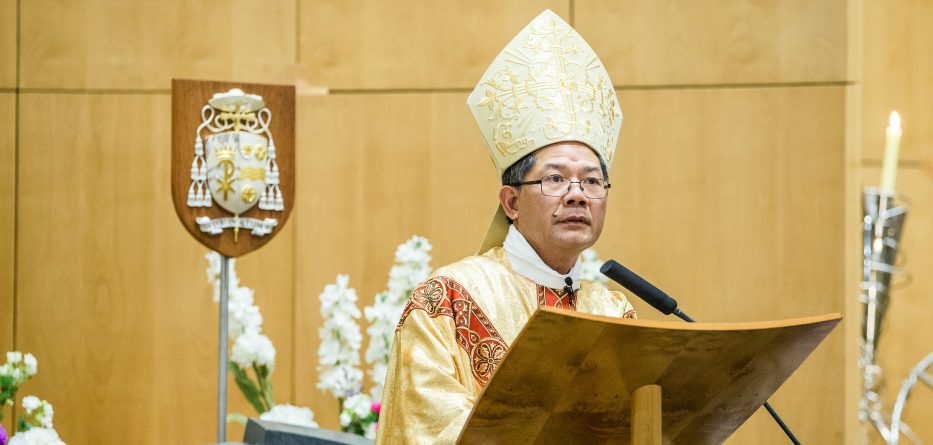Most Reverend Vincent Long Van Nguyen OFM Conv DD STL, Bishop of Parramatta
Homily for the Easter Vigil in the Holy Night in Year B 2018 at St Patrick’s Cathedral, Parramatta
31 March 2018
“This is the day the Lord has made. Let us rejoice and be glad!”
My dear friends,
Tonight, we have come to celebrate the centerpiece and foundation of our Christian faith. Easter gives us hope, strength and direction in our endeavour to change the world around us according the Kingdom vision of Jesus. It gives us the courage to keep reaching, keep working and keep fighting for a better future, a better society, a better world and a better Church. Yes, the victory of Christ over evil and darkness emboldens us. His love and shalom accompany us as we seek to transform lives and relationships against the tendency to tame the Gospel spirit, to keep status quo and to resist change. In spite of the daily problems and setbacks we encounter, Easter provides with the horizons of hope within which we labour for the Kingdom.
Easter is God’s victory of love. There is nothing in the world that can separate us, and the whole of creation from the love of God revealed in the life, death and resurrection of Jesus. He was betrayed, denied, rejected and killed, yet his love never failed. It transcended all limits. The Easter story is therefore not primarily about a rescue operation for fallen, hellbound humanity. Just as Christmas or the Incarnation is not an after-thought of an angry God, the Easter story is about God’s love breaking through human barriers and empowering us to become all that we are capable to be.
The Incarnation shows God to be a boundary breaker. Jesus abandoned his own status and made himself a slave. This pattern continued in his life, ministry and culminated in his death and resurrection. In so doing, he invited us to step beyond our fears and to rise above our limits. The boundary breaking spirit of Jesus spurs us on to share God’s life and love to the world, even at the cost of ourselves. It is in this spirit, that Pope Francis has called upon the Church to move away from its preoccupation with the status quo, wealth, privilege and security. Instead, we must learn to be a more daring, missionary, humble and servant church.
The Gospel tonight speaks of mourning and loss. Mary of Magdala went to the tomb early Sunday morning as women often do for their recently deceased loved ones. She probably fixed the flowers, attended to the oil lamp and felt the stone that separated her from the deceased. Then Mary sat down and began to let her tears flow. Memories of Jesus flooded her and her grief grew more and more intense. She is a symbol of the Church in mourning during Holy Saturday which is a liminal interval, a time in which one stands between the old and the new. Like Mary, we are in grief because of the loss that we are afflicted with. Our greatest suffering is the apparent absence of God in the midst of our trials. Let us mourn his death and his absence from us – but not like people who have no hope. For the dark night is the necessary part of the ascent to God.
The Gospel does not end there with Mary in grief. It tells us of her encounter with the Risen Lord who calls out her name and reaffirms his personal relationship with her. Mary in turn recognises him and discovers her Lord as no longer bruised, battered and lifeless but transformed, risen and alive. Her grief is changed to joy and she herself is transformed. She is charged with proclaiming to others the Good News of the Resurrection. She becomes an apostle to the apostles. The risen Lord empowers her to rise above her limits and she proclaims him with freshness and vitality.
The Church owes it to women disciples like Mary of Magdala to find fresh expressions of the Gospel spirit. It seems to me that we have a way to go yet in terms of appreciating women’s gifts and utilising them for the benefit of the faith community. Until we have truly incorporated women’s gifts and the gift of women, we will not be able to fully energise the life of the Church. In fact, if the truth be known, it was the female followers who showed faithfulness and enduring love more so than their male counterparts. Nowhere else is this discrepancy more obvious than at the critical hours of our Lord. If the Church has a bright future, it must reclaim a discipleship of equals and empower men and women disciples equally to share their gifts for human flourishing and the growth of the Kingdom.
The Easter victory continues when we commit ourselves to the struggle for truth, justice and the fullness of life, confident that God will make good his plan of salvation. Let us endeavour to live the rhythm of Christ dying and rising in the Church and in all facets of our lives. Then we can be certain that the loving God will bring about renewal and transformation as He brought Jesus Christ to life from the dead.








